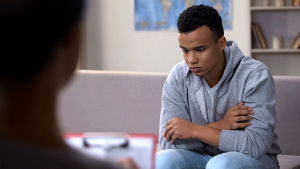 Adolescence is a period of significant changes, and sometimes it can be challenging to distinguish normal fluctuations in moods from a mood disorder, such as bipolar disorder. Bipolar disorder is a mental health condition that affects a person’s mood, energy level, and behavior. If left untreated, it can lead to severe consequences, including self-harm and suicide. Therefore, it is vital to seek help immediately if you suspect your child has bipolar disorder. Let’s consider information on adolescent bipolar disorder treatment, including the signs, therapies used during treatment, and the benefits of seeking help from professionals. For more about adolescent mental health treatment programs, call us today at 888.904.5947. You can also reach us via our online contact form.
Adolescence is a period of significant changes, and sometimes it can be challenging to distinguish normal fluctuations in moods from a mood disorder, such as bipolar disorder. Bipolar disorder is a mental health condition that affects a person’s mood, energy level, and behavior. If left untreated, it can lead to severe consequences, including self-harm and suicide. Therefore, it is vital to seek help immediately if you suspect your child has bipolar disorder. Let’s consider information on adolescent bipolar disorder treatment, including the signs, therapies used during treatment, and the benefits of seeking help from professionals. For more about adolescent mental health treatment programs, call us today at 888.904.5947. You can also reach us via our online contact form.
What Is Adolescent Bipolar Disorder?
Adolescent bipolar disorder, also known as manic-depressive illness, is a complex mental health condition that profoundly impacts a person’s:
- Emotional well-being
- Energy levels
- Behavior patterns
- Ability to carry out daily activities
This condition manifests through intense and often unpredictable mood swings, oscillating between periods of elevated moods, referred to as mania, and episodes of deep sadness and despair, known as depression. In some cases, individuals may even experience a combination of both mood states simultaneously, a state called a mixed episode.
These mood swings can be prolonged and persist for several weeks or even months, exerting a significant toll on the affected person’s social relationships, academic performance, and overall quality of life.
Signs of Adolescent Bipolar Disorder
Recognizing the signs of bipolar disorder in adolescents can be challenging, as there isn’t a specific test to diagnose this condition. Some signs that may indicate bipolar disorder include:
- Frequent mood swings
- Depression
- Irritability
- Loss of interest in activities once enjoyed
- Poor communication
- Poor judgment
- Reckless behavior
Additionally, sleeping less than usual, talking rapidly, and experiencing racing thoughts are other warning signs that you need to seek help from a professional.
What Is Adolescent Bipolar Disorder Treatment?
Adolescent bipolar disorder treatment is a comprehensive and holistic program specifically designed to assist individuals in effectively managing their bipolar disorder symptoms. This specialized treatment approach encompasses a range of therapeutic interventions, including evidence-based medication and psychotherapy.
These interventions are carefully tailored to meet the unique and specific needs of each client, ensuring a personalized and effective treatment plan. By addressing the multifaceted aspects of bipolar disorder, this comprehensive program aims to empower adolescents with the necessary tools and strategies to lead fulfilling and balanced lives.
Therapies Used in Treatment
The most common therapies used during adolescent bipolar disorder treatment include:
- Cognitive-behavioral therapy (CBT)
- Psychotherapy
- Family therapy
- Medication
CBT helps individuals identify and change negative thought patterns and behaviors. Psychotherapy helps clients learn how to cope with their condition and make positive changes in their lives. Family therapy helps create a supportive environment for the client. Finally, medication can help to stabilize moods and reduce symptoms.
Benefits of Adolescent Bipolar Disorder Treatment in Florida
There are numerous compelling benefits to receiving adolescent bipolar disorder treatment in Florida. Firstly, early diagnosis plays a pivotal role in identifying and addressing the condition promptly, preventing potential complications in the future.
Moreover, individuals have access to a wide range of highly skilled mental health professionals who specialize in treating bipolar disorder in adolescents. These experts work closely with clients to develop personalized treatment plans that cater to their unique needs, maximizing the chances of successful outcomes.
Additionally, receiving treatment can contribute to an improved quality of life, as it allows individuals to access various support services and resources that promote holistic well-being. Lastly, seeking treatment can reduce the risk of hospitalization or suicide, highlighting the importance of comprehensive and specialized care in managing bipolar disorder in adolescents effectively.
Get Help Today with Family First Adolescent Services
If you suspect your child has bipolar disorder, don’t hesitate to seek help. Family First Adolescent Services provides comprehensive, personalized treatment for adolescent bipolar disorder. Our team of professionals is committed to providing the best care possible for clients.
Seeking treatment from a mental health professional can significantly improve the quality of life and reduce the risk of hospitalization or suicide. Contact Family First Adolescent Services today at 888.904.5947 or via our online form to learn more about how we can help you and your child.
